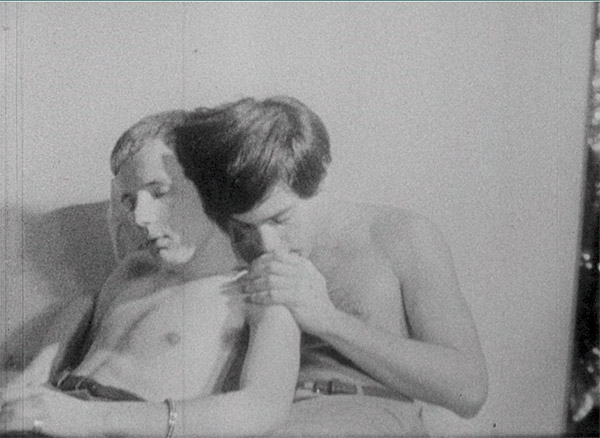Join us for a post-screening discussion with guest curator and Sonbert archivist Jon Gartenberg, in person.
This weekend of four analog 16mm film programs celebrates the work of Warren Sonbert (1947–1995), a filmmaker driven by the belief that “independent film...is the only avenue for those who want to take risks and satisfy their own self-imposed demands.” Adapted for the National Gallery of Art from a series originally curated by Jon Gartenberg for the Museum of Modern Art. All titles are shown in 16mm film format. See the second day’s programming.
Program 1: Sonbert’s Whirl through Warhol’s World
Sonbert began making films in 1966, as a student at New York University’s (NYU) film school. His earliest films, in which he captured the spirit of his generation, were inspired first by university life and then by the denizens of the Warhol art world.
Where Did Our Love Go? (1966, 15 minutes)
Sonbert recalled, “Warhol Factory days…serendipity visits, Janis and Caselli and Bellevue glances…Malanga at work…glances at Le Mépris and North by Northwest…. Girl rock groups and a disco opening…a romp through the Modern.”
Hall of Mirrors (1966, 7 minutes)
An outgrowth of Sonbert’s film classes at NYU, he reedits outtakes from a Hollywood film (starring Fredric March and Florence Eldridge), adding found footage with scenes of Warhol superstar René Ricard in reflective moments, and Gerard Malanga in public view at an art gallery. The film has a sophisticated circular structure, beginning and ending with the protagonists’ movements enmeshed within multiple reflecting mirrors.
The Tenth Legion (1967, 30 minutes)
This film exemplifies Sonbert’s use of a constantly moving hand-held camera as it trails the college-aged protagonists in choreographed fashion, with chiaroscuro lighting effects in interior scenes. His attention to capturing the minutiae of daily existence is a precursor to his mature montage films in which he melded diverse human gestures into a unified global vision.
Program 2: Queer Identity
Of the many creative and cultural universes inhabited by Sonbert, none was perhaps more acutely experienced, yet least publicly acknowledged, than his homosexual identity and affliction with AIDS. This program examines his relationship to the LGBTQ+ universe.
Amphetamine (Codirected with Wendy Appel, 1966, 10 minutes)
In his provocative and playful first film, Sonbert depicts young men shooting amphetamines and making love in the era of sex, drugs, and rock and roll.
Noblesse Oblige (1981, 25 minutes)
A masterfully edited work featuring imagery Sonbert filmed of protests in San Francisco following the murders of Mayor George Moscone and Councilman Harvey Milk at the hands of Dan White. Sonbert modeled the structure of this film on Douglas Sirk’s Tarnished Angels (1957).
Short Fuse (1992, 37 minutes)
Following his AIDS diagnosis, the film is a turbulent expression of his heightened emotional state, collaging images of war, protest, and rest with shifting musical passages from both classical and popular music.
Whiplash (1995/1997, 20 minutes)
Preceding his death from AIDS, Sonbert channeled all of his energy into making his final work, Whiplash, completed posthumously by filmmaker Jeff Scher. A multilayered portrayal of Sonbert’s struggle to maintain his physical equilibrium, his perceptual reality, and the world of friends and family around him, it articulates the ideas and values for which he intended to be remembered.
Warren (1991, 3 minutes)
In Warren, Jeff Scher turns the table on his former teacher and mentor, creating an intimate dialogue between friends, as well as a battle of directorial wills, at a moment when Scher recognized that Sonbert was becoming ill.
Part of the We Have Always Been Here 2024 film series
The end time for this event is estimated. End times may vary with post-screening discussion, audience Q&A, or other factors. All film events finish by 5:00 p.m.
